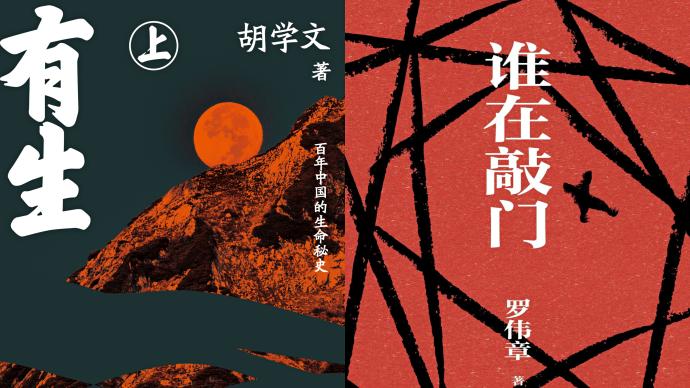
On June 22, the first Gao Xiaosheng Literary Award was announced in Changzhou: Hu Xuewen's "Life" and Luo Weizhang's "Who's Knocking on the Door" jointly won the novel award; Yiming's "Lake and Vitality" won; the short story award went to Chi Zijian's "The Sound of Drinking Soup", Fan Xiaoqing's "The Heartless Thing", Wang Xiangfu's "Paradise Suona", Zhong Qiushi's "Father's Long River" and Zhu Hui's "Tian Shui". 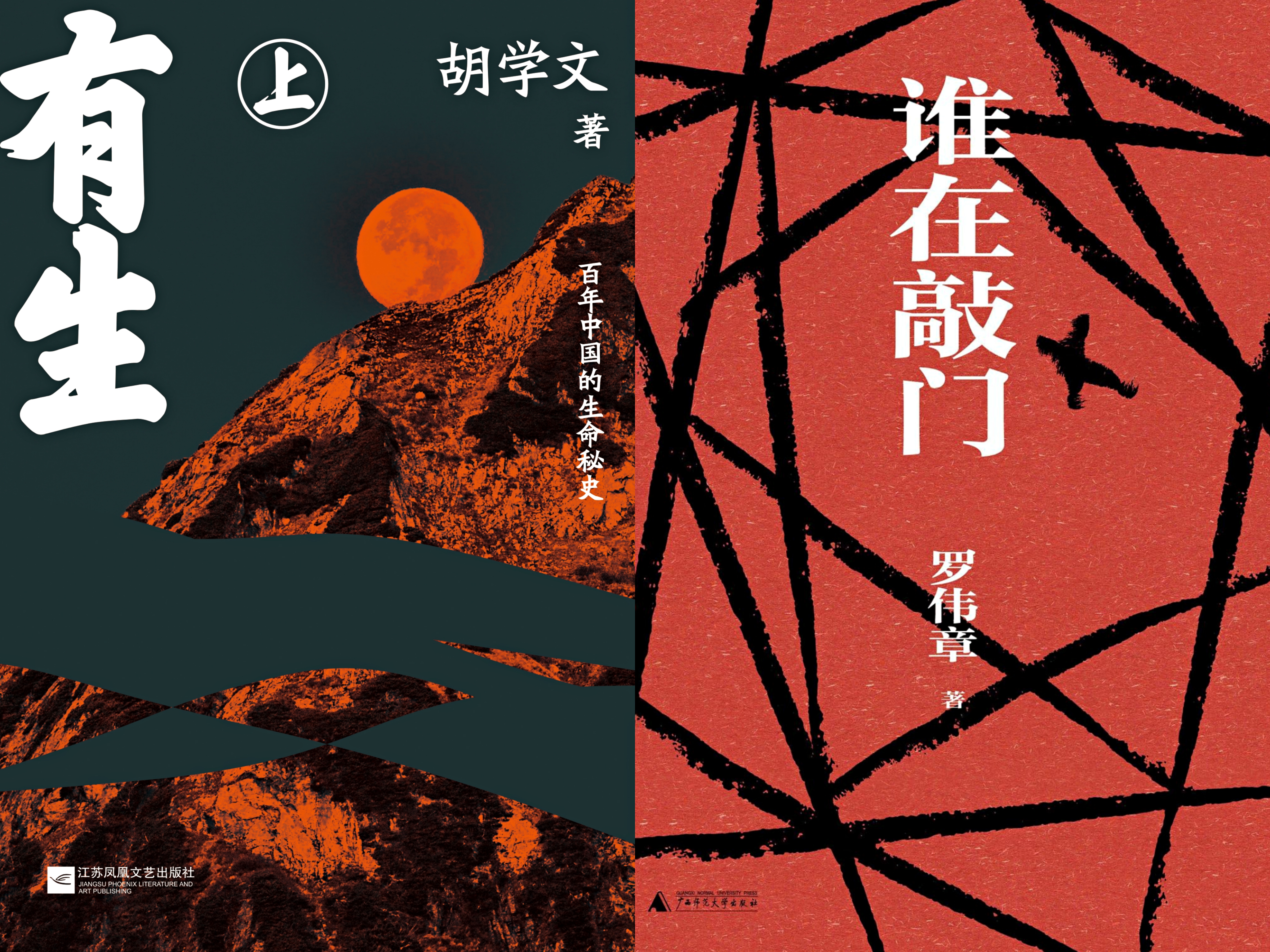
"The Gao Xiaosheng Literary Award is unique among many literary awards in the country. At the beginning of its establishment, it was clear that outstanding new rural novels were selected as the selection object and selection criteria. This is the distinctive feature of the Gao Xiaosheng Literary Award, and it is also an inherent part of the continued success of the Gao Xiaosheng Literary Award. Vitality." said Ding Jie, Deputy Director of the Jury Committee of the First Gao Xiaosheng Literary Award.
Wang Binbin, a professor at Nanjing University, also said that the strong realistic concern and family and country feelings, strong stylistic awareness and language pursuit, striving for simplicity and simplicity, and adherence to realism... These are the characteristics of Gao Xiaosheng's literature, and also Gao Xiaosheng's great achievements. He hoped that the establishment of the Gao Xiaosheng Literary Award would enable Gao Xiaosheng's fine tradition to be better inherited and carried forward.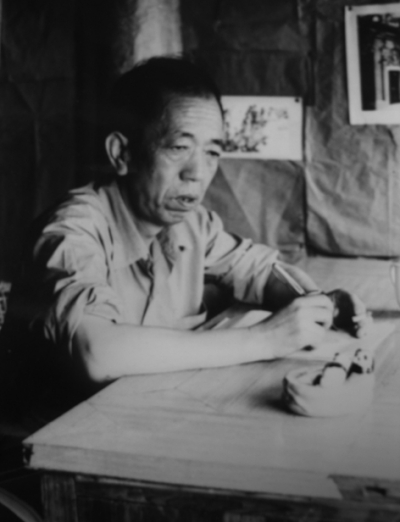
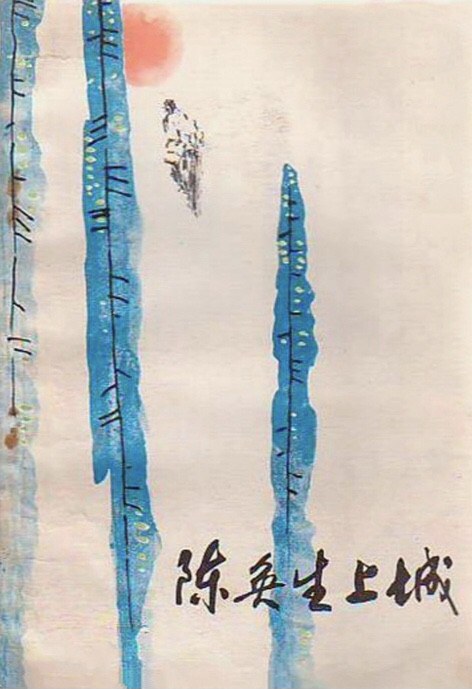
It is reported that the selection of the first Gao Xiaosheng Literary Award adopts the nomination and recommendation system. The nomination committee consists of 8 critics, 13 literary journals and 3 literary publishers. A total of 223 works were collected during the nomination and recommendation stage. The authors participating in the review are all active and powerful writers, including Mo Yan, Yu Hua, Yan Lianke, Chi Zijian, etc. In the end, 43 novels, 68 novellas and 101 short stories were nominated for the preliminary review. From March 2nd to 4th this year, the preliminary evaluation of the first Gao Xiaosheng Literary Award was held in Changzhou in two rounds, and 10 novels, 15 novellas, and 25 short stories entered the final evaluation.
At the final evaluation meeting, Wu Yiqin, member of the Party Group, Vice Chairman and Secretary of the Secretariat of the Chinese Writers Association, Bi Feiyu, Vice Chairman of the Chinese Writers Association and Chairman of the Jiangsu Writers Association, He Xiangyang, Director of the Creation and Research Department of the Chinese Writers Association, Member of the Party Group, Secretary of the Secretariat of the Jiangsu Writers Association, Vice Chairman Ding Jie, Professor Ding Fan of Nanjing University, Professor Wang Binbin of Nanjing University, Professor Meng Fanhua of Shenyang Normal University, Wang Qian, former editor-in-chief of Selected Novels, and Huang Xiaochu, former president of Jiangsu Phoenix Literature and Art Publishing House, composed of nine experts and scholars. The online and offline methods were fully discussed and voted, and then the results of the first Gao Xiaosheng Literary Award were announced.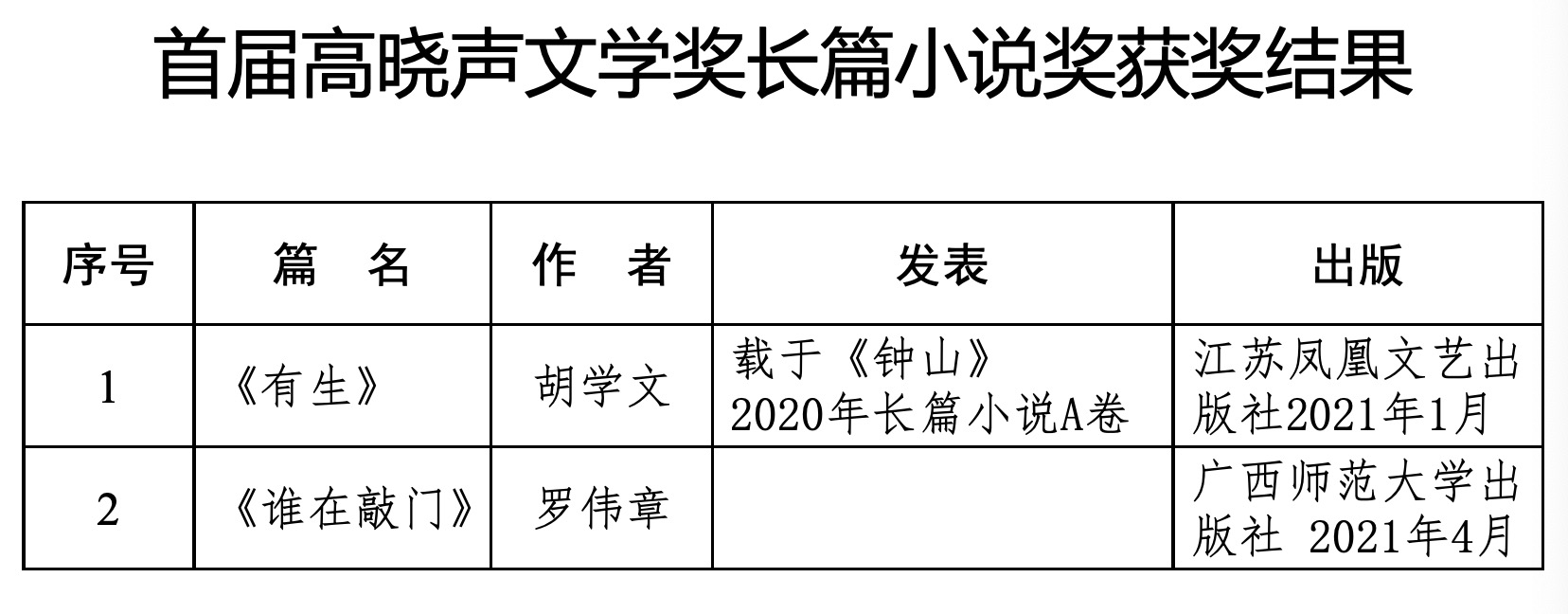
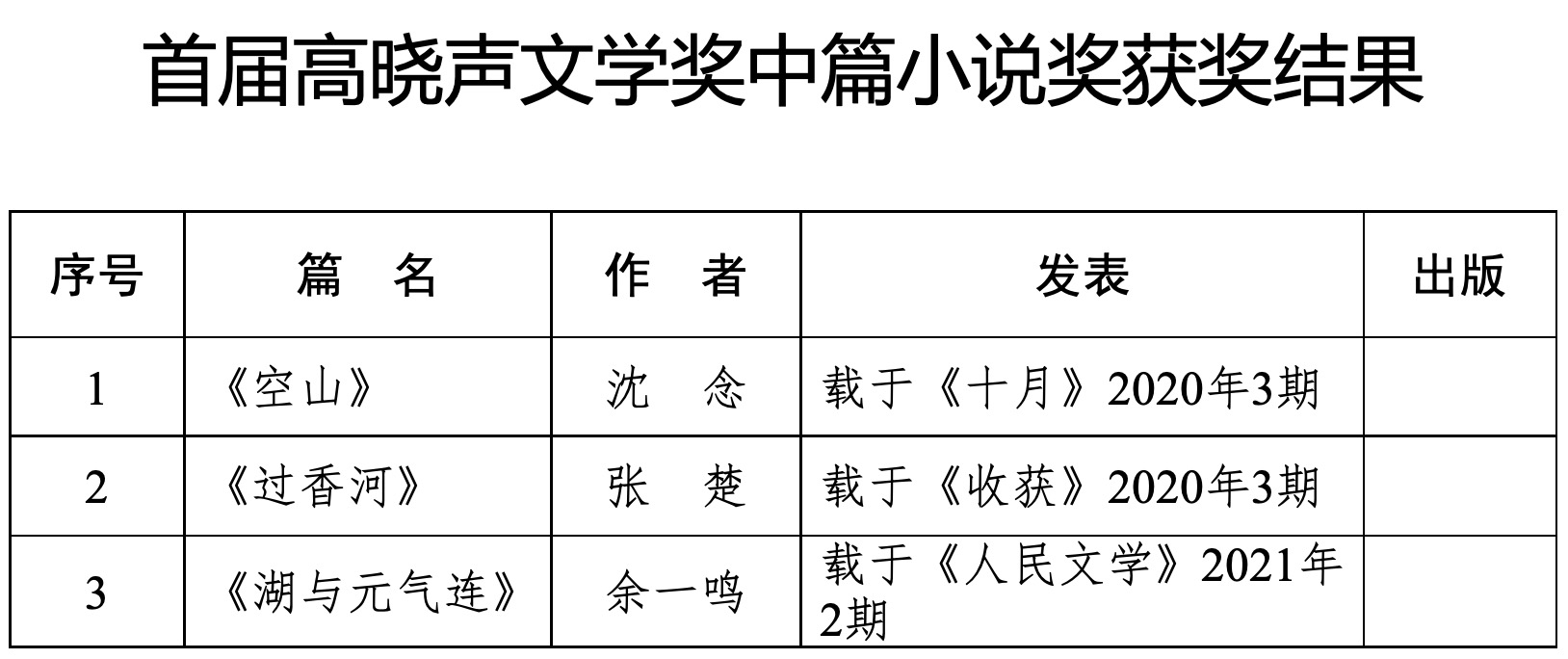
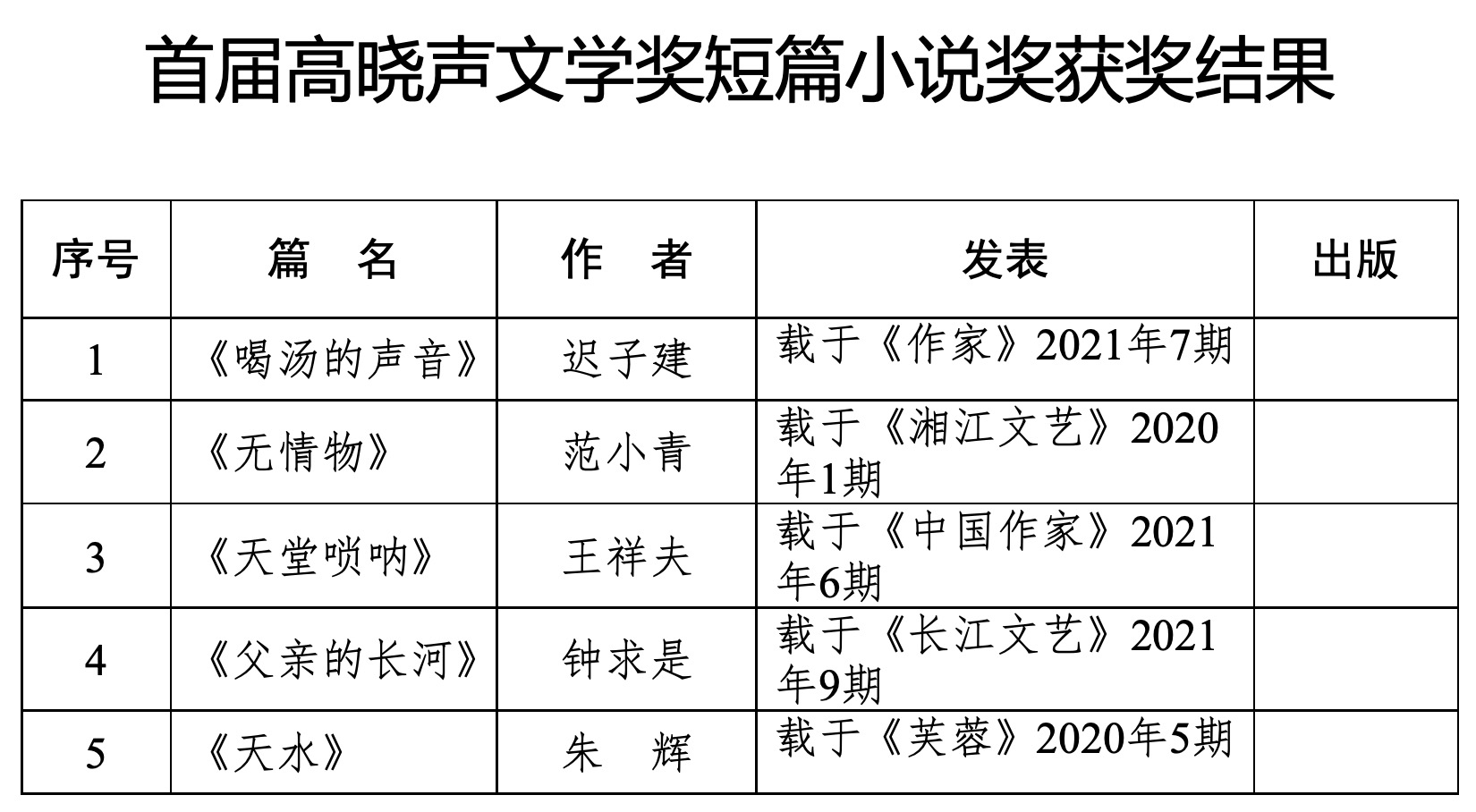 Regarding the ten works that won the first Gao Xiaosheng Literary Award, Huang Xiaochu, the former president of Jiangsu Phoenix Literature and Art Publishing House, commented that although they are different in subject matter, length and artistic style, they all share some commonalities that make the judges' eyes light up and make them smile. It is reflected in the following aspects: First, pay attention to the reality and the life of ordinary people, just as Gao Xiaosheng and the "Li Shunda" and "Chen Huansheng" around him breathe and share the same fate, thus shaping the history of literature. The immortal image of Le Dao; second, excavate the grand theme in the one-third of the land of human nature, show the cross-section of history, demonstrate the indomitable human beings in the face of the ups and downs of fate, and write the light and dark, gentle and cold, and hard of human nature. and soft; third, the selected long, medium and short stories have brought their respective genre characteristics and advantages into full play. "You Have Life" and "Who's Knocking on the Door" are hundreds of thousands of words or even millions of words. A giant structure with an undeniable epic character, the five short stories are all small and exquisite, intercepting a cross-section of life to express the authors' family and country, parent-child, past and present thoughts and distinctions, while the middle chapter has both the dense narrative and the inheritance. The lightness, the ingenious conception, and the organic nature of each; Fourth, the respective aesthetic tastes and artistic styles of the award-winning authors have been vividly reflected in the award-winning works.
Regarding the ten works that won the first Gao Xiaosheng Literary Award, Huang Xiaochu, the former president of Jiangsu Phoenix Literature and Art Publishing House, commented that although they are different in subject matter, length and artistic style, they all share some commonalities that make the judges' eyes light up and make them smile. It is reflected in the following aspects: First, pay attention to the reality and the life of ordinary people, just as Gao Xiaosheng and the "Li Shunda" and "Chen Huansheng" around him breathe and share the same fate, thus shaping the history of literature. The immortal image of Le Dao; second, excavate the grand theme in the one-third of the land of human nature, show the cross-section of history, demonstrate the indomitable human beings in the face of the ups and downs of fate, and write the light and dark, gentle and cold, and hard of human nature. and soft; third, the selected long, medium and short stories have brought their respective genre characteristics and advantages into full play. "You Have Life" and "Who's Knocking on the Door" are hundreds of thousands of words or even millions of words. A giant structure with an undeniable epic character, the five short stories are all small and exquisite, intercepting a cross-section of life to express the authors' family and country, parent-child, past and present thoughts and distinctions, while the middle chapter has both the dense narrative and the inheritance. The lightness, the ingenious conception, and the organic nature of each; Fourth, the respective aesthetic tastes and artistic styles of the award-winning authors have been vividly reflected in the award-winning works.
"Among the ten award-winning works, seven are about rural or local themes. Most of these works were published in 2020 and 2021, and the writing time must have been earlier. When the authors wrote these works, they did not know a promotion and incentives The Gao Xiaosheng Award for New Country Writing is waiting for them, but they are still full of passion and no hesitation to put their love, hatred and hatred, joys, sorrows and joys into writing, dedicated to the countryside, to the farmers, and to those in the fields. Ordinary people who work in the fields have dedicated themselves to that piece of land that is either rich or barren." Huang Xiaochu said that the other non-local works that won the award this time also recorded the efforts and struggles of a generation of Chinese, such as "Drinking" "The Voice of Tang" describes the peculiar fate brought to a family by national hatred and family hatred, "Crossing the Fragrant River" records the struggle of those who have fled their homeland against their fate in a foreign land, and "The Long River of Father" shows Alzheimer's patients In the face of the disease, he is stubborn and firm.
It is reported that the Gao Xiaosheng Literary Award will be held every two years, and this year's Gao Xiaosheng Literary Award ceremony is planned to be held in September and October this year.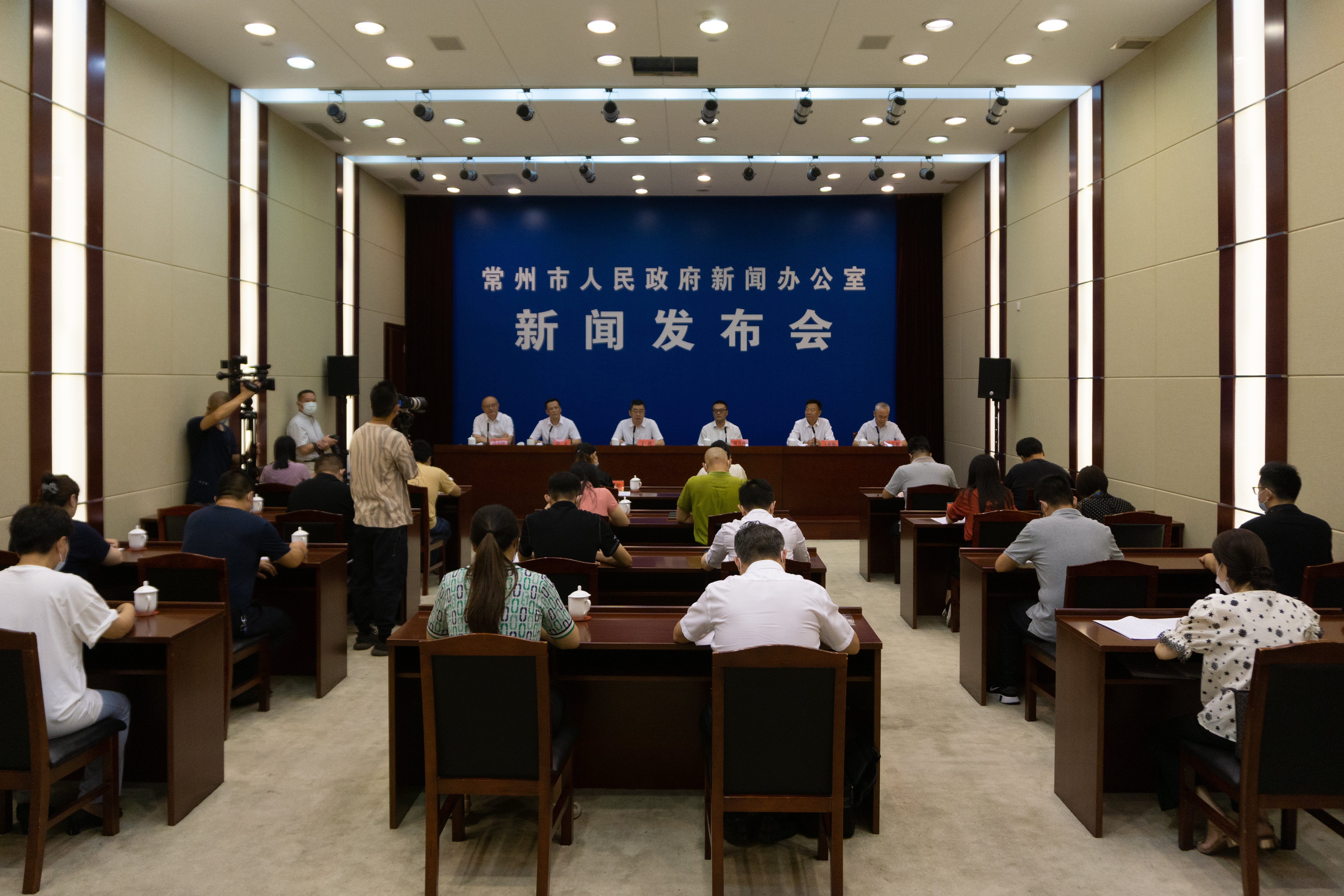
Novels (2)
Hu Xuewen's "Life"
A hundred years of rural land is the theme that Chinese writers never tire of writing, and it is also a challenge to Chinese writers' narrative ability. Hu Xuewen took eight years to meet this challenge and completed this masterpiece called "The Mountains". Hu Xuewen used the method of making compressed food to describe the family changes over a century, and packed the capacity of "food" to the extreme in a limited space. The structure of novels is generally based on time as the vertical line, and "Life" reflects a rare sense of space in the structure. One day, one night and one hundred years of Chinese history are condensed into the umbrella-shaped super "chip", each branch and leaf is saturated with the writer's deep affection and nostalgia for the land, crops, villagers, and life, and also contains bloody and tearful contemplation and grief . It is another masterpiece of local novels after "The Ancient Ship" and "White Deer Plain".
Luo Weizhang "Who is knocking on the door"
Luo Weizhang's novel Who's Knocking on the Door describes the form of rural ethics "exploding" under the impact of modern civilization, which is an elegy for farming civilization. The novel takes the "father"'s "exit". His critical illness and death mean that his once rural culture has no choice but to fall. In the process of "falling away", the codes of human nature are revealed one by one, and the shadow of history is deep. reveal deeply. This is a very painful novel, the pain of relatives, the pain of the country, the pain of losing one's home, the pain of no home, the pain of the country is running, the running country is in pain. Luo Weizhang's narration is long and strong, delicate and charming, skillfully changing the character's perspective, penetrating the character's psychology, writing to the depths, and being silent as earth.
Novella (3)
Shen Nian "Empty Mountain"
Shen Nian's novella "Empty Mountain" is based on the current reality. It is very difficult to express the current reality in the form of novels. It is required that novels can not only have a profound insight into reality, but also cannot stop at the observation of reality. reality. For a long time, excellent works in this area are rare. "Empty Mountain" adopts the narrative method of scattered perspective, and multiple story threads develop independently and intersect with each other. While showing the complexity of rural problems, it also shows the complexity of human nature. "Empty Mountain" is a commendable exploration of how literature expresses current reality.
"Crossing the Fragrant River" by Zhang Chu
Zhang Chu's novella takes the activities of the character Mi Mi as the main line, and takes the narrator "I" and the stories of several other characters as the sub-line, presenting the complex relationship between the chaos of reality and human desires. Reality encourages the savage growth of human desires, but it is impossible to satisfy all desires. Therefore, there is a wonderful interaction between reality and desire. Reality is both a fertile soil for cultivating desire and an iron cage for restraining desire; and desire is both the offspring of reality and constantly becoming reality itself. The desires of all living beings flourish under the guidance of reality, and they are often shattered in the face of reality. "Crossing the Fragrant River" profoundly reveals the embarrassment and hardship of ordinary characters in a certain era.
Yu Yiming's "Lake and Vitality Link"
Yu Yiming's novella "Lake and Vitality Link" is structured in the form of two clues of reality and history. The experience of college student village official Wang Sanyue as secretary in Shangyuan Village is a clue to reality, and the situation in Shangyuan Village during the Anti-Japanese War is a clue to history. Taking the above Yuancun as an example, expressing the understanding of the rural reality and the expectation of the rural future is the main theme of the novel, and the introduction of historical clues makes the novel's expression of reality have a special depth. The college student village official Wang Sanyue's cultural background, growth experience, and moral sentiment are obviously different from those of the local village cadres, but the novel does not describe the relationship between Wang Sanyue and the local cadres as a simple oppositional relationship, nor does it make simple for the local cadres. moral evaluation. Fiction writes about the complexities of rural politics and is therefore of particular value.
Short Stories (5)
Chi Zijian "The Sound of Drinking Soup"
Chi Zijian's "The Sound of Drinking Soup" may be an anomaly in her novel creation, which is different from her usual poetic writing and lyrical tone. This novel can be called magical realism. It writes about the life of an ordinary person, Harabo, between the real and the fantasy. His life is not a legend, but it also links the historical vicissitudes of the Ussuri River area for more than a hundred years. From 1897 From the beginning of the year to the return of the educated youth to the city and then to today's life scene, the "sound of soup" suddenly flows through. In recent years, Chi Zijian, with his unusual sense of historical depth, seamlessly connects with people's sense of destiny, greatly expanding the width and thickness of the novel, showing the style of everyone.
Fan Xiaoqing "The Heartless"
Some writers write wisely, and some writers write wisely. Fan Xiaoqing is a writer who writes with wisdom. Her creative enthusiasm and number of creations have been on the rise, especially her quick and agile grasp of new phenomena in current life has become her "signature dish". The short story "Relentless Things" describes the "accidental" events in the process of rural land requisition, the complexity of the multiple contradictions in the current rural society, and the inexplicable connection between "ruthless" and "relief". Slow, vivid characters, we can see the wisdom of the author to understand life and the wisdom of writing.
"Paradise Suona" by Wang Xiangfu
Wang Xiangfu's short story creation has become a landscape in the literary world. His brush and ink can always find the most appropriate balance between lightness and dryness. "Paradise Suona" is a successful narration between sight and hearing, world and heaven, homeland and foreign land, soul and body. The blind man in heaven was abducted and sold to a foreign land, but he returned to his hometown but could not understand the dialect of his hometown. A suona, It conveys the joys and sorrows of the world. Rendering, which was originally a method of Chinese painting, was transformed into novels by Wang Xiangfu, leaving no trace and full of interest.
Zhong Qiushi's "Father's Long River"
Zhong Qiushi's short story "Father's Long River" takes a common senile disease as the theme and expresses a unique sense of life. In the novel, there is a problem with my father's memory, he often has no memory of recent events, and the people closest to him often don't know each other. However, he has a clearer and clearer memory of the hometown he lived in as a child, but he never forgets the elementary school he attended in his childhood. The novel narrates the process of father's spiritual change in simple language, and often has shocking details in the calm expression. At the end of the novel, it is the father alone driving the boat to the river that he was familiar with when he was a child. This is the river engraved in my father's memory, the river that means the source of my father's life. The novel expresses some kind of transcendental thinking in the narrative of a mental illness.
Zhu Hui "Tian Shui"
Zhu Hui's writing has the flavor of running script, the words are firm, but there is an inner connection between the words, the brush and ink are looming, carefully managed and natural. "Tian Shui" is a novel with a strong Gao Xiaosheng style. It seems to be a sequel to "Fishing" and "Wallet". The waves caused by a release pool in a temple write about people and nature, people and money, people and people. The complex and subtle relationships and entanglements between people describe the "alienation" of people and the "alienation" of things. The novel is full of realism, but it also contains symbols, which infuses huge energy into the limited space.

Hu Xuewen's "Life" and Luo Weizhang's "Who's Knocking on the Door" jointly won the novel award
Gao Xiaosheng is a late famous writer from Changzhou and an outstanding writer in the field of Chinese contemporary literature, especially in the field of local novels. It has also become an important literary symbol of Changzhou, Jiangsu and even the whole Chinese literature. The Literary Award named after Gao Xiaosheng will be officially launched in 2021. It is guided by the Jiangsu Writers Association and the Propaganda Department of the Changzhou Municipal Party Committee, sponsored by the Changzhou Federation of Literary and Art Circles, and co-organized by the Changzhou Institute of Literature and Art and the Changzhou Writers Association. 3 novella awards and 5 short story awards."The Gao Xiaosheng Literary Award is unique among many literary awards in the country. At the beginning of its establishment, it was clear that outstanding new rural novels were selected as the selection object and selection criteria. This is the distinctive feature of the Gao Xiaosheng Literary Award, and it is also an inherent part of the continued success of the Gao Xiaosheng Literary Award. Vitality." said Ding Jie, Deputy Director of the Jury Committee of the First Gao Xiaosheng Literary Award.
Wang Binbin, a professor at Nanjing University, also said that the strong realistic concern and family and country feelings, strong stylistic awareness and language pursuit, striving for simplicity and simplicity, and adherence to realism... These are the characteristics of Gao Xiaosheng's literature, and also Gao Xiaosheng's great achievements. He hoped that the establishment of the Gao Xiaosheng Literary Award would enable Gao Xiaosheng's fine tradition to be better inherited and carried forward.

Gao Xiaosheng was writing at the former residence in 1980. Photo by Tang Xiyong

Gao Xiaosheng's masterpiece "Chen Huansheng Goes to the City"
The scope of the first Gao Xiaosheng Literary Award is from January 1, 2020 to November 30, 2021 in the official national newspapers, publications, publishing houses, and websites to publicly publish and publish works, in order to focus on China's new countryside in the changing times, Pay attention to the reality of the new countryside in the development of the new era, shape the characters of the new countryside with typical significance, explore the rich inner world of the people in the construction of the new countryside, carry forward the entrepreneurial and creative spirit of the people in the rise of the new countryside, and write a magnificent new countryside epic as the theme.It is reported that the selection of the first Gao Xiaosheng Literary Award adopts the nomination and recommendation system. The nomination committee consists of 8 critics, 13 literary journals and 3 literary publishers. A total of 223 works were collected during the nomination and recommendation stage. The authors participating in the review are all active and powerful writers, including Mo Yan, Yu Hua, Yan Lianke, Chi Zijian, etc. In the end, 43 novels, 68 novellas and 101 short stories were nominated for the preliminary review. From March 2nd to 4th this year, the preliminary evaluation of the first Gao Xiaosheng Literary Award was held in Changzhou in two rounds, and 10 novels, 15 novellas, and 25 short stories entered the final evaluation.
At the final evaluation meeting, Wu Yiqin, member of the Party Group, Vice Chairman and Secretary of the Secretariat of the Chinese Writers Association, Bi Feiyu, Vice Chairman of the Chinese Writers Association and Chairman of the Jiangsu Writers Association, He Xiangyang, Director of the Creation and Research Department of the Chinese Writers Association, Member of the Party Group, Secretary of the Secretariat of the Jiangsu Writers Association, Vice Chairman Ding Jie, Professor Ding Fan of Nanjing University, Professor Wang Binbin of Nanjing University, Professor Meng Fanhua of Shenyang Normal University, Wang Qian, former editor-in-chief of Selected Novels, and Huang Xiaochu, former president of Jiangsu Phoenix Literature and Art Publishing House, composed of nine experts and scholars. The online and offline methods were fully discussed and voted, and then the results of the first Gao Xiaosheng Literary Award were announced.


 Regarding the ten works that won the first Gao Xiaosheng Literary Award, Huang Xiaochu, the former president of Jiangsu Phoenix Literature and Art Publishing House, commented that although they are different in subject matter, length and artistic style, they all share some commonalities that make the judges' eyes light up and make them smile. It is reflected in the following aspects: First, pay attention to the reality and the life of ordinary people, just as Gao Xiaosheng and the "Li Shunda" and "Chen Huansheng" around him breathe and share the same fate, thus shaping the history of literature. The immortal image of Le Dao; second, excavate the grand theme in the one-third of the land of human nature, show the cross-section of history, demonstrate the indomitable human beings in the face of the ups and downs of fate, and write the light and dark, gentle and cold, and hard of human nature. and soft; third, the selected long, medium and short stories have brought their respective genre characteristics and advantages into full play. "You Have Life" and "Who's Knocking on the Door" are hundreds of thousands of words or even millions of words. A giant structure with an undeniable epic character, the five short stories are all small and exquisite, intercepting a cross-section of life to express the authors' family and country, parent-child, past and present thoughts and distinctions, while the middle chapter has both the dense narrative and the inheritance. The lightness, the ingenious conception, and the organic nature of each; Fourth, the respective aesthetic tastes and artistic styles of the award-winning authors have been vividly reflected in the award-winning works.
Regarding the ten works that won the first Gao Xiaosheng Literary Award, Huang Xiaochu, the former president of Jiangsu Phoenix Literature and Art Publishing House, commented that although they are different in subject matter, length and artistic style, they all share some commonalities that make the judges' eyes light up and make them smile. It is reflected in the following aspects: First, pay attention to the reality and the life of ordinary people, just as Gao Xiaosheng and the "Li Shunda" and "Chen Huansheng" around him breathe and share the same fate, thus shaping the history of literature. The immortal image of Le Dao; second, excavate the grand theme in the one-third of the land of human nature, show the cross-section of history, demonstrate the indomitable human beings in the face of the ups and downs of fate, and write the light and dark, gentle and cold, and hard of human nature. and soft; third, the selected long, medium and short stories have brought their respective genre characteristics and advantages into full play. "You Have Life" and "Who's Knocking on the Door" are hundreds of thousands of words or even millions of words. A giant structure with an undeniable epic character, the five short stories are all small and exquisite, intercepting a cross-section of life to express the authors' family and country, parent-child, past and present thoughts and distinctions, while the middle chapter has both the dense narrative and the inheritance. The lightness, the ingenious conception, and the organic nature of each; Fourth, the respective aesthetic tastes and artistic styles of the award-winning authors have been vividly reflected in the award-winning works."Among the ten award-winning works, seven are about rural or local themes. Most of these works were published in 2020 and 2021, and the writing time must have been earlier. When the authors wrote these works, they did not know a promotion and incentives The Gao Xiaosheng Award for New Country Writing is waiting for them, but they are still full of passion and no hesitation to put their love, hatred and hatred, joys, sorrows and joys into writing, dedicated to the countryside, to the farmers, and to those in the fields. Ordinary people who work in the fields have dedicated themselves to that piece of land that is either rich or barren." Huang Xiaochu said that the other non-local works that won the award this time also recorded the efforts and struggles of a generation of Chinese, such as "Drinking" "The Voice of Tang" describes the peculiar fate brought to a family by national hatred and family hatred, "Crossing the Fragrant River" records the struggle of those who have fled their homeland against their fate in a foreign land, and "The Long River of Father" shows Alzheimer's patients In the face of the disease, he is stubborn and firm.
It is reported that the Gao Xiaosheng Literary Award will be held every two years, and this year's Gao Xiaosheng Literary Award ceremony is planned to be held in September and October this year.

Photo courtesy of the organizer of the conference site
[Attachment] The first Gao Xiaosheng Literary Award awarding speechNovels (2)
Hu Xuewen's "Life"
A hundred years of rural land is the theme that Chinese writers never tire of writing, and it is also a challenge to Chinese writers' narrative ability. Hu Xuewen took eight years to meet this challenge and completed this masterpiece called "The Mountains". Hu Xuewen used the method of making compressed food to describe the family changes over a century, and packed the capacity of "food" to the extreme in a limited space. The structure of novels is generally based on time as the vertical line, and "Life" reflects a rare sense of space in the structure. One day, one night and one hundred years of Chinese history are condensed into the umbrella-shaped super "chip", each branch and leaf is saturated with the writer's deep affection and nostalgia for the land, crops, villagers, and life, and also contains bloody and tearful contemplation and grief . It is another masterpiece of local novels after "The Ancient Ship" and "White Deer Plain".
Luo Weizhang "Who is knocking on the door"
Luo Weizhang's novel Who's Knocking on the Door describes the form of rural ethics "exploding" under the impact of modern civilization, which is an elegy for farming civilization. The novel takes the "father"'s "exit". His critical illness and death mean that his once rural culture has no choice but to fall. In the process of "falling away", the codes of human nature are revealed one by one, and the shadow of history is deep. reveal deeply. This is a very painful novel, the pain of relatives, the pain of the country, the pain of losing one's home, the pain of no home, the pain of the country is running, the running country is in pain. Luo Weizhang's narration is long and strong, delicate and charming, skillfully changing the character's perspective, penetrating the character's psychology, writing to the depths, and being silent as earth.
Novella (3)
Shen Nian "Empty Mountain"
Shen Nian's novella "Empty Mountain" is based on the current reality. It is very difficult to express the current reality in the form of novels. It is required that novels can not only have a profound insight into reality, but also cannot stop at the observation of reality. reality. For a long time, excellent works in this area are rare. "Empty Mountain" adopts the narrative method of scattered perspective, and multiple story threads develop independently and intersect with each other. While showing the complexity of rural problems, it also shows the complexity of human nature. "Empty Mountain" is a commendable exploration of how literature expresses current reality.
"Crossing the Fragrant River" by Zhang Chu
Zhang Chu's novella takes the activities of the character Mi Mi as the main line, and takes the narrator "I" and the stories of several other characters as the sub-line, presenting the complex relationship between the chaos of reality and human desires. Reality encourages the savage growth of human desires, but it is impossible to satisfy all desires. Therefore, there is a wonderful interaction between reality and desire. Reality is both a fertile soil for cultivating desire and an iron cage for restraining desire; and desire is both the offspring of reality and constantly becoming reality itself. The desires of all living beings flourish under the guidance of reality, and they are often shattered in the face of reality. "Crossing the Fragrant River" profoundly reveals the embarrassment and hardship of ordinary characters in a certain era.
Yu Yiming's "Lake and Vitality Link"
Yu Yiming's novella "Lake and Vitality Link" is structured in the form of two clues of reality and history. The experience of college student village official Wang Sanyue as secretary in Shangyuan Village is a clue to reality, and the situation in Shangyuan Village during the Anti-Japanese War is a clue to history. Taking the above Yuancun as an example, expressing the understanding of the rural reality and the expectation of the rural future is the main theme of the novel, and the introduction of historical clues makes the novel's expression of reality have a special depth. The college student village official Wang Sanyue's cultural background, growth experience, and moral sentiment are obviously different from those of the local village cadres, but the novel does not describe the relationship between Wang Sanyue and the local cadres as a simple oppositional relationship, nor does it make simple for the local cadres. moral evaluation. Fiction writes about the complexities of rural politics and is therefore of particular value.
Short Stories (5)
Chi Zijian "The Sound of Drinking Soup"
Chi Zijian's "The Sound of Drinking Soup" may be an anomaly in her novel creation, which is different from her usual poetic writing and lyrical tone. This novel can be called magical realism. It writes about the life of an ordinary person, Harabo, between the real and the fantasy. His life is not a legend, but it also links the historical vicissitudes of the Ussuri River area for more than a hundred years. From 1897 From the beginning of the year to the return of the educated youth to the city and then to today's life scene, the "sound of soup" suddenly flows through. In recent years, Chi Zijian, with his unusual sense of historical depth, seamlessly connects with people's sense of destiny, greatly expanding the width and thickness of the novel, showing the style of everyone.
Fan Xiaoqing "The Heartless"
Some writers write wisely, and some writers write wisely. Fan Xiaoqing is a writer who writes with wisdom. Her creative enthusiasm and number of creations have been on the rise, especially her quick and agile grasp of new phenomena in current life has become her "signature dish". The short story "Relentless Things" describes the "accidental" events in the process of rural land requisition, the complexity of the multiple contradictions in the current rural society, and the inexplicable connection between "ruthless" and "relief". Slow, vivid characters, we can see the wisdom of the author to understand life and the wisdom of writing.
"Paradise Suona" by Wang Xiangfu
Wang Xiangfu's short story creation has become a landscape in the literary world. His brush and ink can always find the most appropriate balance between lightness and dryness. "Paradise Suona" is a successful narration between sight and hearing, world and heaven, homeland and foreign land, soul and body. The blind man in heaven was abducted and sold to a foreign land, but he returned to his hometown but could not understand the dialect of his hometown. A suona, It conveys the joys and sorrows of the world. Rendering, which was originally a method of Chinese painting, was transformed into novels by Wang Xiangfu, leaving no trace and full of interest.
Zhong Qiushi's "Father's Long River"
Zhong Qiushi's short story "Father's Long River" takes a common senile disease as the theme and expresses a unique sense of life. In the novel, there is a problem with my father's memory, he often has no memory of recent events, and the people closest to him often don't know each other. However, he has a clearer and clearer memory of the hometown he lived in as a child, but he never forgets the elementary school he attended in his childhood. The novel narrates the process of father's spiritual change in simple language, and often has shocking details in the calm expression. At the end of the novel, it is the father alone driving the boat to the river that he was familiar with when he was a child. This is the river engraved in my father's memory, the river that means the source of my father's life. The novel expresses some kind of transcendental thinking in the narrative of a mental illness.
Zhu Hui "Tian Shui"
Zhu Hui's writing has the flavor of running script, the words are firm, but there is an inner connection between the words, the brush and ink are looming, carefully managed and natural. "Tian Shui" is a novel with a strong Gao Xiaosheng style. It seems to be a sequel to "Fishing" and "Wallet". The waves caused by a release pool in a temple write about people and nature, people and money, people and people. The complex and subtle relationships and entanglements between people describe the "alienation" of people and the "alienation" of things. The novel is full of realism, but it also contains symbols, which infuses huge energy into the limited space.
Related Posts